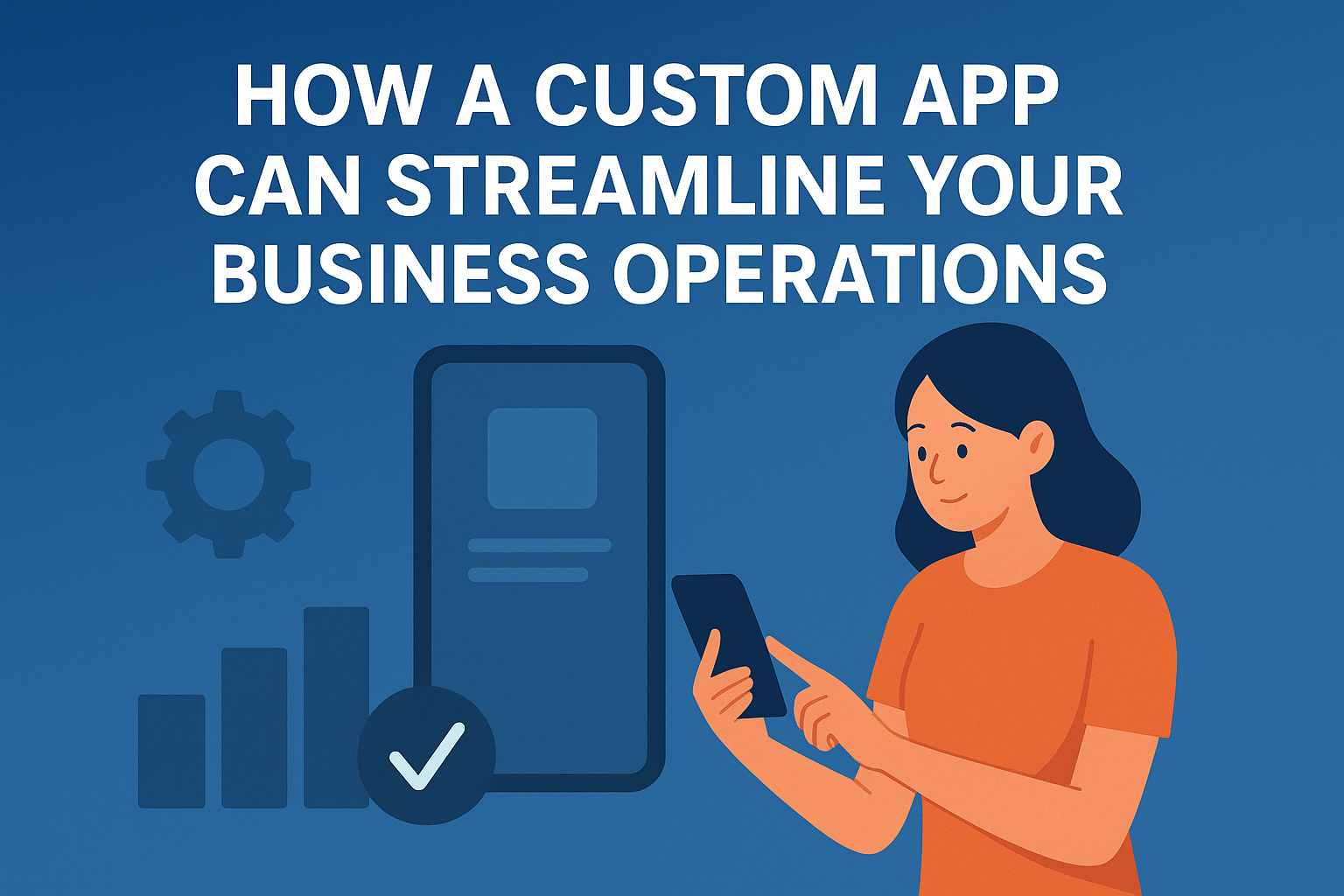In an increasingly digital world, businesses are constantly seeking ways to enhance productivity, streamline operations, and deliver better customer experiences. While off-the-shelf software solutions can be effective to a point, they often fall short when it comes to meeting the specific needs of a company. This is where custom app development services come into play.
A custom app is a software application developed specifically to address the unique challenges, workflows, and goals of a particular business. Rather than adapting your operations to fit into a rigid, pre-built system, a custom app is designed to adapt to you. Whether you’re a small startup or a large enterprise, custom apps offer a powerful, flexible, and scalable solution that can transform the way you do business.
This article explores what a custom app is, the benefits it offers, and how it can streamline your business operations for long-term success.
What Is a Custom App?
A custom application (or custom software) is a program or suite of programs created to fulfill the specific requirements of an organization, team, or individual. Unlike off-the-shelf software — which is developed for mass-market use and aims to solve common, generalized problems — a custom app is tailored to a business’s unique environment, processes, and goals.
Custom apps can be developed for internal use (e.g., employee portals, workflow automation, inventory tracking) or external engagement (e.g., customer-facing mobile apps, booking systems, or e-commerce platforms). Depending on the business need, these applications may run on the web, mobile devices, or desktop environments.
Key Features of Custom Apps
- Tailor-made functionality aligned with your specific workflows
- Scalability to grow as your business grows
- Integration capabilities with your existing systems and platforms
- Enhanced security by implementing custom security measures
- Better user experience (UX) through personalized interfaces and features
By focusing on precision and personalization, custom apps can significantly boost productivity, cut costs, and improve overall business performance.
Benefits of Custom Apps
Custom apps provide a wide range of advantages that go beyond what off-the-shelf software can deliver. Here are the most impactful benefits:
1. Tailored to Your Business Needs
No two businesses are exactly alike. A custom app is built specifically to match your unique processes, goals, and user behaviors. This leads to a better fit for your team and customers, which enhances usability and efficiency.
For example, a manufacturing company might need software that integrates machine sensors for real-time analytics, while a real estate firm might need a CRM tailored to handle property listings and customer inquiries. With a custom app, you get what you need — nothing more, nothing less.
2. Improved Efficiency and Productivity
Custom apps are optimized to automate and streamline repetitive tasks, reduce manual errors, and consolidate workflows. This enables employees to focus more on strategic tasks rather than spending time on inefficient manual processes.
For instance, automating tasks like reporting, scheduling, or order processing can reduce the time and effort spent on them by more than 50%, significantly improving team productivity.
3. Seamless Integration with Existing Systems
Businesses often rely on multiple software solutions, such as CRM systems, ERPs, or cloud services. Off-the-shelf software may not always integrate well with these existing tools, causing data silos and inefficiencies.
Custom apps, however, are built with integration in mind. Whether you’re using Salesforce, QuickBooks, or a proprietary legacy system, a custom app can pull and push data seamlessly, ensuring smooth and unified operations across platforms.
4. Greater Scalability
As your business grows, your software needs will evolve. Off-the-shelf solutions can become limiting over time, requiring costly upgrades or workarounds. A custom app, on the other hand, is built with your future in mind.
You can start small, then add features and modules as your company expands. This makes custom software a long-term investment that evolves with your business rather than holding it back.
5. Competitive Advantage
Having a tool built specifically for your organization gives you a unique advantage over competitors who are using generic systems. You can implement features and strategies that are exclusive to your company, helping you to innovate faster, respond to market trends more effectively, and offer services that are tailored to your clients’ needs.
6. Enhanced Security
Security is a growing concern, especially with the rise in cyberattacks and data breaches. Off-the-shelf software often has known vulnerabilities that attackers can exploit. Working with a reputable mobile app design agency to build a custom app can offer an extra layer of security, as these apps are not publicly available and can be designed with robust security protocols specific to your industry.
You also control who has access to the app and what data is shared.
7. Better Customer Experience
A custom app can be designed to directly address your customers’ pain points, improving their interaction with your brand. Features like personalized dashboards, intuitive navigation, and faster load times lead to higher satisfaction and loyalty.
How a Custom App Can Streamline Your Business Operations
Implementing a custom application doesn’t just offer convenience — it can become a core driver of operational efficiency and digital transformation. Here’s how a custom app can streamline your business operations:
1. Automating Manual Processes
Many organizations still rely on manual data entry, paper-based records, or redundant workflows. These practices not only waste time but also introduce room for human error.
A custom app can automate these processes:
- Generating invoices automatically
- Scheduling appointments
- Managing employee shifts
- Tracking inventory in real time
- Auto-generating performance reports
By replacing manual work with automated processes, businesses can cut down on errors, reduce time waste, and operate more efficiently.
2. Real-Time Data and Analytics
Having access to real-time data is crucial for decision-making. Custom apps can be built with dashboards and analytics tools that provide:
- Up-to-date performance metrics
- Customer behavior analysis
- Sales tracking
- Financial forecasting
This data can be visualized in charts, graphs, or reports that are easy to understand and act upon. Real-time insights enable proactive decision-making, rather than reactive problem-solving.
3. Unified Communication and Collaboration
Especially in hybrid or remote work environments, having a centralized platform for communication and collaboration is essential. A custom internal app can serve as a hub for:
- Team messaging
- Project management
- File sharing
- Video conferencing integration
- Task assignments and status tracking
Instead of juggling between multiple platforms (like email, Slack, Trello, and Dropbox), your team can collaborate in one unified environment, improving transparency and accountability.
4. Customized Workflow Management
Each department in your business may follow a different workflow. With a custom app, you can build role-specific modules that cater to various teams:
- HR can manage hiring and employee onboarding
- Sales can track leads and conversions
- Finance can monitor budgets and expenses
- Operations can optimize supply chain logistics
Having custom workflows built into one system ensures consistency, transparency, and better process control.
5. Improved Resource Allocation
With a custom app, you can better manage and allocate resources — whether it’s time, money, people, or equipment. For example:
- Track how many hours employees are spending on tasks
- Monitor which departments are over or under budget
- See which machines are underutilized
Armed with these insights, businesses can optimize how resources are used, ultimately reducing waste and boosting ROI.
6. Enhanced Customer Relationship Management
You can design a custom app that captures the full customer journey, from lead generation to after-sales support. Features might include:
- Lead tracking and follow-up scheduling
- Order history and status updates
- Automated reminders or promotions
- Customer feedback collection
This ensures that your customer relationship management (CRM) process is aligned perfectly with how your business operates, resulting in better service and stronger customer loyalty.
Conclusion
In a fast-paced business environment, companies that can adapt quickly and operate efficiently have the greatest chance of success. Off-the-shelf software may work for general tasks, but it often lacks the flexibility, personalization, and scalability that modern businesses require.
A custom app is more than just a piece of software — it’s a strategic investment in your business’s future. From improving internal workflows to delivering exceptional customer experiences, custom applications empower organizations to run smarter, faster, and more effectively.
Whether you’re looking to automate operations, gain better insights, or create a unique platform for your clients, a custom app provides the tools and flexibility you need to stay ahead of the competition. By aligning your technology with your business strategy, you create a solid foundation for growth, innovation, and long-term success.


